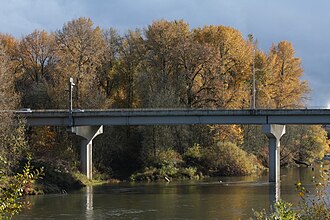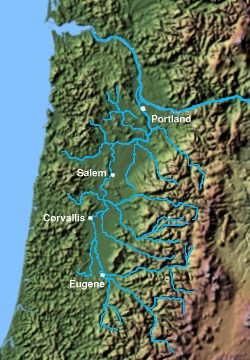Willamette River






Willamette River is a significant river in the Pacific Northwest region of the United States. Originating in the mountains of Oregon, it flows northward for over 187 miles (301 km) before emptying into the Columbia River near the city of Portland. As the largest tributary of the Columbia River by volume, the Willamette plays a crucial role in the ecology, economy, and culture of the region.
Geography[edit]
The Willamette River basin encompasses a diverse range of landscapes, including mountains, forests, valleys, and urban areas. The river itself originates in the Cascade Range, specifically from the confluence of the Middle Fork Willamette River and Coast Fork Willamette River near the city of Eugene. It then flows northward through the fertile Willamette Valley, which is renowned for its agriculture, particularly the cultivation of grapes for wine production, as well as other crops like hops, fruits, and vegetables.
Throughout its course, the Willamette River passes through several major cities, including Eugene, Salem (the state capital), and Portland, Oregon's largest city. The river is navigable to a significant extent, with the Portland Harbor being a major port that facilitates both domestic and international trade.
Ecology[edit]
The Willamette River basin is home to a rich biodiversity, including various species of fish, birds, and mammals. Notably, it provides critical habitat for several species of salmon and trout, which are essential both for the river's ecosystem and for the cultural and economic practices of local communities, including indigenous peoples. Efforts have been made to improve the river's water quality and restore natural habitats to protect these species, especially in light of historical pollution and habitat destruction.
Environmental Issues[edit]
Historically, the Willamette River has faced numerous environmental challenges, including pollution from agricultural runoff, industrial discharges, and urban wastewater. These issues have led to significant ecological impacts, including the degradation of water quality and the loss of habitat for many species. In recent decades, there has been a concerted effort by government agencies, non-profit organizations, and local communities to clean up the river and restore its ecological health. This includes initiatives to reduce pollution, protect wetlands, and rehabilitate areas that have been adversely affected by human activities.
Cultural and Recreational Importance[edit]
The Willamette River holds significant cultural value for the people of Oregon. It has been a vital resource and a central part of the region's history and development. The river is also a popular recreational destination, offering opportunities for fishing, boating, kayaking, and swimming. Additionally, the Willamette River Water Trail is a network of access points and sites along the river that encourages outdoor recreation and environmental stewardship.
Conservation and Management[edit]
The management of the Willamette River involves multiple stakeholders, including federal, state, and local agencies, as well as indigenous tribes, non-profit organizations, and the general public. Efforts to conserve the river and its surrounding environment focus on balancing ecological health with economic development and recreational use. This includes implementing regulations to protect water quality, restoring natural habitats, and promoting sustainable practices among industries and communities that rely on the river.
Ad. Transform your life with W8MD's Budget GLP-1 injections from $75


W8MD offers a medical weight loss program to lose weight in Philadelphia. Our physician-supervised medical weight loss provides:
- Weight loss injections in NYC (generic and brand names):
- Zepbound / Mounjaro, Wegovy / Ozempic, Saxenda
- Most insurances accepted or discounted self-pay rates. We will obtain insurance prior authorizations if needed.
- Generic GLP1 weight loss injections from $75 for the starting dose.
- Also offer prescription weight loss medications including Phentermine, Qsymia, Diethylpropion, Contrave etc.
NYC weight loss doctor appointmentsNYC weight loss doctor appointments
Start your NYC weight loss journey today at our NYC medical weight loss and Philadelphia medical weight loss clinics.
- Call 718-946-5500 to lose weight in NYC or for medical weight loss in Philadelphia 215-676-2334.
- Tags:NYC medical weight loss, Philadelphia lose weight Zepbound NYC, Budget GLP1 weight loss injections, Wegovy Philadelphia, Wegovy NYC, Philadelphia medical weight loss, Brookly weight loss and Wegovy NYC
|
WikiMD's Wellness Encyclopedia |
| Let Food Be Thy Medicine Medicine Thy Food - Hippocrates |
Medical Disclaimer: WikiMD is not a substitute for professional medical advice. The information on WikiMD is provided as an information resource only, may be incorrect, outdated or misleading, and is not to be used or relied on for any diagnostic or treatment purposes. Please consult your health care provider before making any healthcare decisions or for guidance about a specific medical condition. WikiMD expressly disclaims responsibility, and shall have no liability, for any damages, loss, injury, or liability whatsoever suffered as a result of your reliance on the information contained in this site. By visiting this site you agree to the foregoing terms and conditions, which may from time to time be changed or supplemented by WikiMD. If you do not agree to the foregoing terms and conditions, you should not enter or use this site. See full disclaimer.
Credits:Most images are courtesy of Wikimedia commons, and templates, categories Wikipedia, licensed under CC BY SA or similar.
Translate this page: - East Asian
中文,
日本,
한국어,
South Asian
हिन्दी,
தமிழ்,
తెలుగు,
Urdu,
ಕನ್ನಡ,
Southeast Asian
Indonesian,
Vietnamese,
Thai,
မြန်မာဘာသာ,
বাংলা
European
español,
Deutsch,
français,
Greek,
português do Brasil,
polski,
română,
русский,
Nederlands,
norsk,
svenska,
suomi,
Italian
Middle Eastern & African
عربى,
Turkish,
Persian,
Hebrew,
Afrikaans,
isiZulu,
Kiswahili,
Other
Bulgarian,
Hungarian,
Czech,
Swedish,
മലയാളം,
मराठी,
ਪੰਜਾਬੀ,
ગુજરાતી,
Portuguese,
Ukrainian
